As a Commodity Trading Advisor (CTA), 2100 Xenon Group trades futures with the goal of generating absolute returns uncorrelated with broader markets. 2100 Xenon operates under the principles that markets are fundamentally inefficient, and liquidity drives investor behavior.
Markets Media interviewed Jay Feuerstein, chief executive officer and chief investment officer of the curiously named firm, via e-mail on April 4.
Markets Media: Tell us about the history of 2100 Xenon.
Jay Feuerstein: I founded Xenon Capital Management in 2001.
The first strategy was a high-volatility U.S. Treasury strategy that depended heavily on the dominance of Fed policy on the direction of interest rates. Post 9/11, when terrorism dictated the bond markets even more than Fed policy, the model broke down, leading me and co-founder Steve Schnur to retool.
The current strategies launched in August 2004. Learning from my first missteps, I learned that we needed to diversify markets and timeframes and manage risk on shorter timeframes and keep target risk low. I also learned that I needed to put all of my alpha-generating models in one portfolio.

In early 2006, after three outstanding years of performance, 2100 Xenon began working with Old Mutual, which was looking to invest in a CTA.
Old Mutual was interested in higher volatility, however, and even more diversification, which resulted in the beginning of the Managed Futures (2x) strategy. By late 2008, I reached an agreement with Old Mutual to become the 18th affiliate of Old Mutual U.S. Holdings, a $250 billion asset manager. The new entity changed to 2100 Xenon Group, which remains an affiliate of Old Mutual and has grown assets under management from $71 million to more than $200 million today.
MM: Describe your investment methodology - is it purely quantitative?
JF: Our investment methodology is quantitative, yet it starts with a fundamental understanding of a particular profit opportunity in the market. Our belief is that no model has any merit if it does not have an underlying reason to exist.
MM: What are your main investment themes/initiatives currently?
JF: Currently, we are long stocks, long bonds, long energies, long commodities, and short the dollar. We are also in trades which benefit when volatility declines, though we do not trade options.
MM: What makes your firm different from other investment firms in a crowded space?
JF: Firstly, our expertise and experience understanding and trading on global central bank policy. Second, our experience and expertise in the global fixed-income markets; third, our state-of-the-art risk management that recalibrates portfolio risk every time we trade. And, finally, our ability to build factor-based quantitative models that augment the trend-following portion of what we do.
MM: Can you elaborate on how 2100 Xenon deploys an ‘experience-driven approach’ to investing?
JF: I have been trading these markets since 1981, and co-founder Steve Schnur has been a trader since 1990. Jeff Bolduc and Alex Reed have traded since 2005. We are an experienced group that uses that experience to define, quantify and evaluate when models are born — and when they die. Investors need to understand their models in order to make sure they don't exist past their usefulness, and experience is key to this.
MM: Why futures and not equities or equity options?
JF: I believe futures are the cheapest, most focused, liquid and transparent markets on the planet. They allow diversification and specificity far beyond equities and their options.
MM: How does market volatility play into your overall strategy, and how are you managing through a low-vol market?
JF: We are a long-volatility strategy that prides itself on capturing opportunities during times of crisis in traditional long-only strategies. That said, we have recently added a ‘Vega’ model, which measures volatility and defines risk regimes. When risk is ‘on’ we expect stocks, commodities and currencies to rally. When risk is ‘off’ we expect those markets to fall and bonds to rally. So we have tried to exploit the recent changes in correlations through changes in volatility. Last year we were one of the best performers in our space. This year, our Managed Futures (2x) strategy is doing well, though the Global Long/Short Fixed Income strategy is underperforming in this low-volatility environment.
MM: How (if at all) are you affected by fundamental developments such as economic news and government budget deficits?
JF: In the short term, we have intraday trading systems that react to fundamental developments. The day of the ‘flash crash’ (in May 2010) was one of the best days in our trading history. In the mid term and longer term, we have fundamentally based factor models that take changes in factors such as fiscal and economic news and use them to predict market prices.














